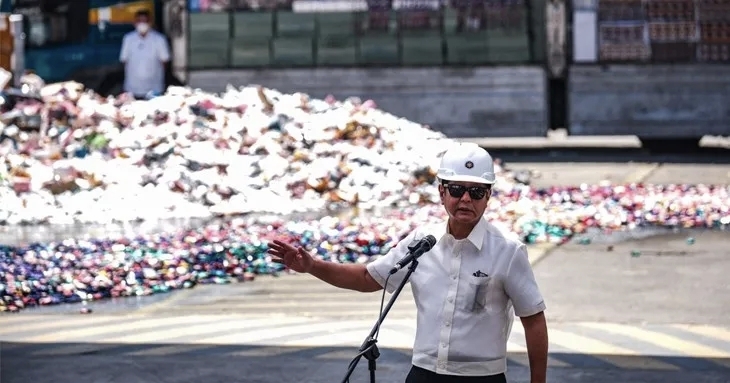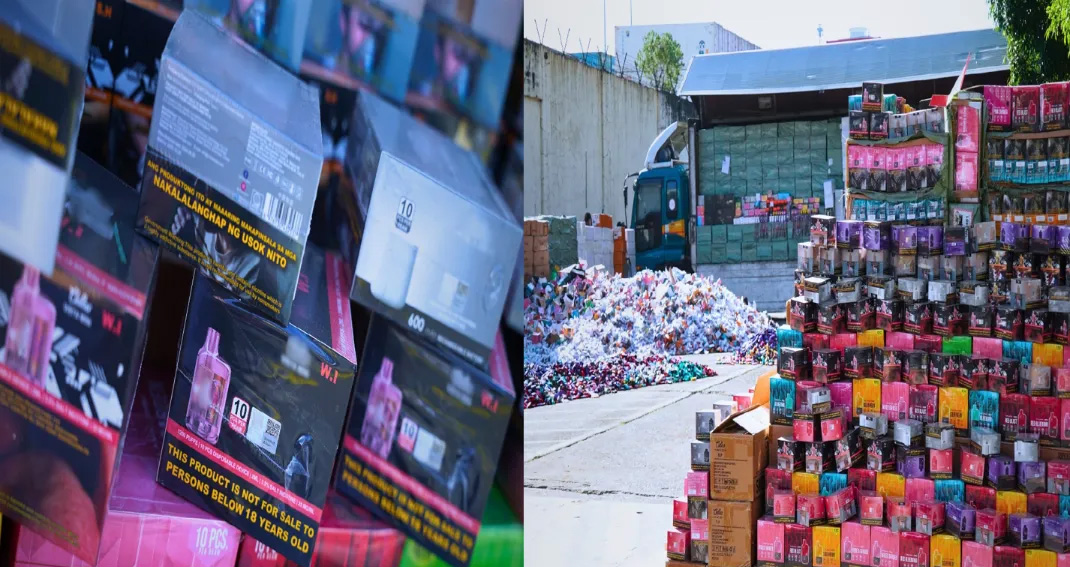Philippine Electronic Cigarette Product Information
作者:EPP GLOBAL LOGISTICS 时间:2025-04-08
On April 7, 2025, Philippine President Ferdinand R. Marcos Jr. (PBBM) and Treasury Secretary Ralph G. Recto jointly condemned the smuggling of electronic cigarettes and supported the Bureau of Customs (BOC) in confiscating and destroying electronic cigarettes, electronic cigarette components, and accessories worth 3.26 billion pesos. This action aims to warn the public against smuggling activities.
Customs destroys a large number of electronic cigarette products
The Customs Bureau successfully destroyed 2977925 confiscated and seized electronic cigarette products on April 7, 2025. These products were confiscated through 10 seizure operations conducted by the Port of Manila (POM), Manila International Container Port (MICP), and Intelligence Group (IG) in 2024.

Strictly regulate according to the law
This action is carried out in accordance with the Philippine Republic Act No. 11900, the Electronic Cigarette and Non Nicotine Product Regulatory Act. The bill requires strict compliance with regulations regarding the import, distribution, and taxation of electronic cigarettes, non nicotine, and tobacco products to ensure that only safe and compliant products can enter the hands of Filipino consumers.
The President emphasizes health issues
President Marcos said in his speech, "We will continue to carry out such actions, and I want to emphasize that our efforts and the dangers of smuggling electronic cigarettes far exceed the government's tax losses. What is more important to us is the health problems caused by smuggling electronic cigarettes

The Minister of Finance affirms the customs' crackdown on smuggling
During the event, Finance Minister Rektor said, "I commend the Customs Department for taking stronger and stricter measures against smugglers. Our crackdown on smuggling is not only for border protection, but also to defend the economic integrity of our country. By cracking down on illegal trade, we have protected people's access to affordable goods and increased government tax revenue, thereby providing more public services to Filipinos
Customs takes multiple measures to crack down on illegal trade
In order to ensure the continued success of the crackdown on illegal trade, the Customs Bureau has adopted a multi pronged strategy, including strengthening cooperation with domestic and foreign law enforcement agencies, enhancing intelligence collection capabilities, conducting regular on-site inspections, and implementing stricter port control measures.
Collaborate with multiple departments
The Customs Bureau works closely with the Department of Trade and Industry (DTI), the Office for the Special Mandate on Vaporized Nicotine and Non Nicotine Products, their Devices, and Novel Tobacco Products (OSMV), the Regional Intelligence and Liaison Offices (RILO), and other international customs agencies to strengthen law enforcement efforts and combat illegal trade.
Utilizing advanced systems to detect illegal goods
The Customs Bureau is equipped with a Risk Management System and a Cargo Targeting System, which can efficiently identify and detect undeclared.incorrectly declared electronic cigarette goods.
Strengthen on-site inspections and port control
The Customs Bureau is able to conduct regular on-site inspections of imported goods through the implementation of Letters of Authorities (LOAs), which may be available for sale.stored in warehouses.stores. In addition, the Customs Bureau has immediately prevented electronic cigarette products from entering the Philippines by issuing pre registration control orders. orders, as well as conducting physical inspections of target goods at airports and ports.
Event attendees
Also in attendance at this event were Minister of Trade and Industry Ma Cristina Roque, Customs Director Bienvenido Rubio, Bureau of Internal Revenue (BIR) Taxpayer Services Representative Atty. Peter Dator, Chief Counsel of the Office for Special Regulation of Electronic Cigarettes and Non Nicotine Products M. Marcus N. Valdez II, and representatives from the Japan International Cooperation Agency (JICA).





